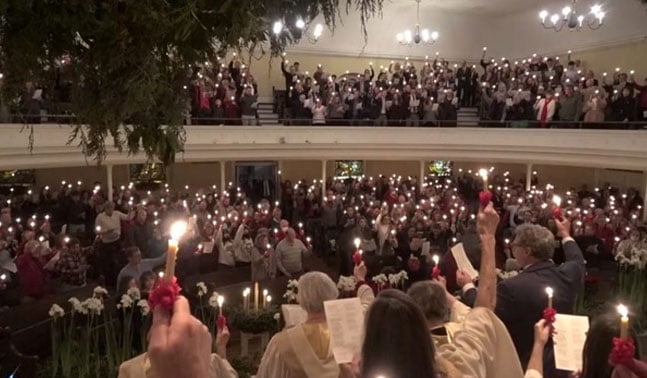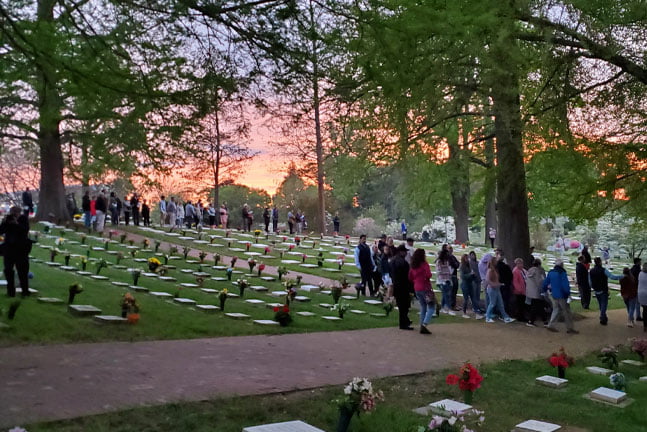The Moravian Church embraces the basic doctrines through the ages, affirmed by the wider Christian Church. Our theological statements are in general agreement with “mainline” Protestant churches. Two of the most widely accepted Christian doctrinal statements, the Apostles’ Creed and the Nicene creeds, are included in our liturgies.
Welcome Home.
Being Moravian
Moravian Sacraments
Moravians Have Two Sacraments (channeling of Divine Grace) – Holy Communion & Baptism
Holy Communion
Holy Communion (the Lord’s Supper) is offered during worship several times throughout the church year. All baptized adult Christians are invited to participate. Baptized children may take Holy Communion following confirmation or pastoral instruction with approval by the Board of Elders. Twice during communion services we offer the “right hand of fellowship” symbolic of the unity we experience in partaking of the body and blood of Jesus Christ.
From its early years in the 15th and 16th centuries, our church has lived by the principle: “In essentials, unity; in non-essentials, liberty; and in all things, love.”
Our early leaders stated that the essentials are that we respond in faith, love and hope to the goodwill of God the Father, the saving work of Christ, and the gifts of the Holy Spirit. Non-essentials would include matters such as the amount of water used in Baptism or the sort of bread used in Holy Communion.
Above all is Christ’s commandment that we love one another.

Baptism (infant, child or adult)
Baptism is a reminder and affirmation of the salvation we know as the result of Jesus Christ’s sacrifice for us on the Cross. For infants and children, it is also a commitment by parents, sponsors and the congregation to raise and nurture children in Christian love and community. Baptisms are performed during regular worship services.
Moravians have not written lengthy volumes of theology, but prefer to emphasize more the living out of our faith in our words and actions. This emphasis is highlighted in our Covenant for Christian Living, which outlines standards for our conduct with one another and with the world.
The Ground of the Unity
The major doctrinal statement of the church is The Ground of the Unity (1957, revised 1995), which emphasizes that the love of God was manifested in the life and death of Jesus. This statement has been approved for use in the worldwide Moravian Church, or the Unitas Fratrum. The church tries to follow the teachings and example of Christ, as well as the inner testimony of the Holy Spirit in everyday affairs, including the pursuit of social justice. The Ground of the Unity affirms the Moravian understanding that ecumenism is a mark of true Christianity.
- With the whole of Christendom we share faith in God the Father, the Son, and the Holy Spirit. We believe and confess that God has revealed Himself once and for all in His Son Jesus Christ; that our Lord has redeemed us with the whole of humanity by His death and resurrection.
- We believe that He is present with us in the Word and the Sacrament; that He directs and unites us through His Spirit and thus forms us into a Church. We hear Him summoning us to follow Him, and we pray to Him to use us in His service.
- He joins us together mutually, so that, knowing ourselves to be members of His body, we become willing to serve each other.
- Jesus Christ … calls each individual personally, and leads each one to the recognition of sin and to the acceptance of the redemption achieved by Christ. In fellowship with Him, [we accept that] the love of Christ becomes more and more the power of our new life, power that penetrates and shapes the entire person.
- We oppose any discrimination in our midst because of race or standing, and we regard it as a commandment of the Lord to bear public witness to this and to demonstrate by word and deed that we are brothers and sisters in Christ.
- We believe that the Lord has called us particularly to mission service among the peoples of the world. In this, and in all other forms of service both at home and abroad, to which the Lord commits us, He expects us to confess Him and witness to His love in unselfish service.
- Our Lord Jesus entered into this world’s misery to bear it and to overcome it. We seek to follow Him in serving His people. Like the love of Jesus, this service knows no bounds. Therefore we pray to the Lord to point out to us the way to reach our neighbors, opening our heart and hand to them in their need.
- In this spirit we await the appearing of Jesus Christ, go forward to meet our Lord with joy, and pray to be found ready when He comes.
Our Traditions

Moravian lovefeasts are a modern version of the “agape” meals held in homes during the New Testament-early Christian era.
At Home Moravian Church we serve coffee and a bun while singing hymns based on the theme of the service, such as mission, Christmas or Good Friday. After everyone has been served by dieners (German for “servers”) a blessing for the meal is spoken: “Come Lord Jesus, Our Guest to be, and bless these gifts bestowed by Thee.”
Everyone partakes while music is provided. A brief message is usually included as part of the service.
Home Moravian Church holds four Lovefeast Services on Christmas Eve, all of which are open to the community. During our Christmas Eve Lovefeast Services, the congregation will enjoy a Christmas message, the singing of Christmas Carols, music provided by the choir, organist and instrumentalists, and the simple meal of a bun and coffee. On Christmas Eve, lighted beeswax candles are passed to everyone, reaffirming faith in Jesus Christ, the Light of the World.
2024 Lovefeast Schedule
- Sunday, August 18, 2024, 10 a.m. – August 13th Festival Lovefeast
- Sunday, November 17, 2024, 10 a.m. – 253rd Anniversary of the Home Moravian Church Congregation
- Tuesday, December 24, 2024, 11 a.m. – Christmas Eve Children’s Lovefeast & Candle Service
- Tuesday, December 24, 2024, 2:30 p.m. – Christmas Eve Family Lovefeast & Candle Service
- Tuesday, December 24, 2024, 5 p.m. – Christmas Eve Lovefeast & Candle Service
- Tuesday, December 24, 2024, 7:45 p.m. – Christmas Eve Lovefeast & Candle Service

The Easter Sunrise Service of the Salem Congregation begins in front of Home Moravian Church and concludes in nearby God’s Acre, as all Moravian graveyards are called. This service typically draws thousands of Christians from near and far.
Easter Sunrise Service of the Moravian Church dates back to 1732, when the first service was held in Herrnhut, Germany, on the estate of Count Nicholas Von Zinzendorf, one of the 18th century founders of the Renewed Moravian Church. Those early Moravians gathered at the first light of dawn among the graves of their departed brothers and sisters, to hail the resurrection of Jesus Christ from the dead, and to sing hymns of praise.
The Sunrise Service has been repeated each year since then at Moravian churches around the world, and is now in practice in many other Christian denominations.
Beginning several hours earlier on Easter morning, Moravian Band members from throughout the region divide into small units and begin playing Easter hymns across the city. The small units gradually come together and form larger groups, until, during the hour before the Sunrise Service begins, four large groups can be heard playing antiphonally in the streets around Old Salem.
The Sunrise Service begins in front of Home Moravian Church, as the presiding minister proclaims, “The Lord is Risen!” then leads the gathered faithful in the Moravian Easter Morning Liturgy, which is essentially a summary of Moravian beliefs and teaching and a confession of faith in the power of the risen Christ.
Midway through the liturgy, the congregation quietly processes two blocks to God’s Acre. There the full band finally joins together for the remainder of the service. The sky brightens, and the service concludes as the sun rises.

Learn More About Being Moravian by Visiting Our Sanctuary During Regular Church Interpretation.
The sanctuary is open from 11 a.m. to 1 p.m., Wednesday through Saturday, from March through November (except Good Friday). Home Moravian Church members welcome visitors and speak informally about the history of the Moravian Church worldwide. They also share the traditions and ministries of our church since its founding in Salem in 1771. Visitors may hear the pipe organ, learn about the exquisite stained-glass windows, and discover just what it means to be a Moravian.
For All Members, the Home Moravian Church Member Portal contains information about various church functions, events, committees, and more. Signing up is easy! Simply complete the registration form, and when you are verified as a member, you will be granted access using your own log in credentials. If you need assistance, contact the Home Moravian Church office at skatona@homemoravian.org.
